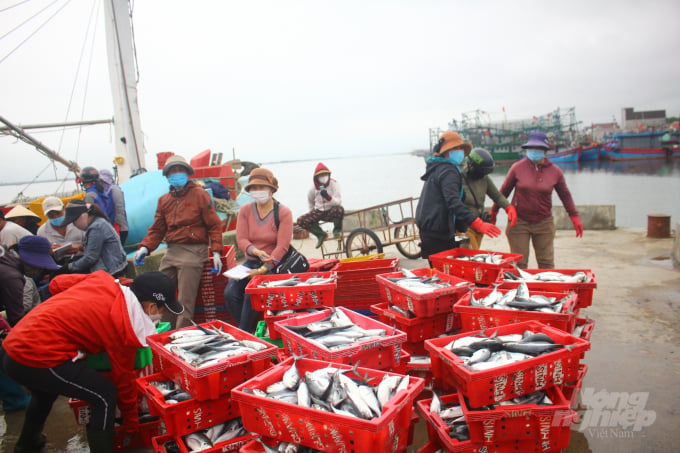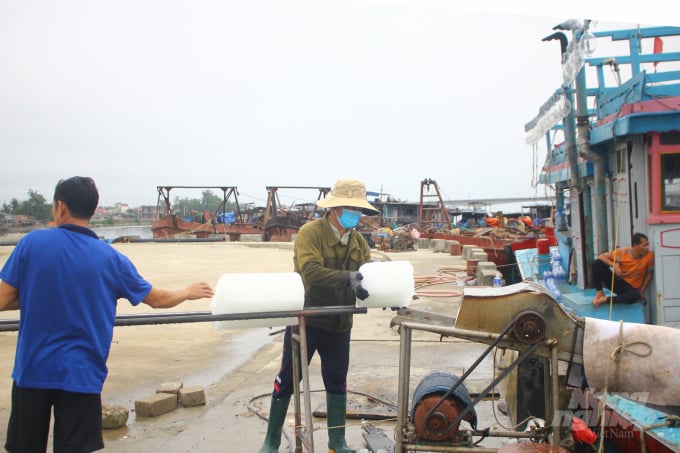May 21, 2025 | 06:23 GMT +7
May 21, 2025 | 06:23 GMT +7
Hotline: 0913.378.918
May 21, 2025 | 06:23 GMT +7
Hotline: 0913.378.918

Quang Tri province is stepping up propaganda and establishment of deep-sea fishing cooperative groups. Photo: CD.
Catching fish in the deep sea had a long tradition in Quang Tri province and it has been seen as the focus for the development of the locality associated with protecting sovereignty over sea and islands. Quang Tri now has around 2,911 fishing vessels with a total capacity of 143,513 CV including 1,602 boats with the length of less than 6 meters and 1,309 ones with a length of 6 meters or more.
These fishing vessels have mainly operated in the fishing grounds including the sea region of Central Vietnam, Paracel Islands and the Gulf of Tonkin. The main gear used were trawl net, purse seines net and fishing rod. Nearly 7,800 workers have been involved in commercial fishing in the province.
In order to build solidarity, create connection among local fishermen in the fisheries sector, Quang Tri's Sub-Department of Fisheries has coordinated with localities and coastal border guard posts to step up propaganda and support the establishment of deep-sea fishing cooperative groups.

Fishing boats anchor at sea in Cua Viet port. Photo: CD.
Until now, the province has organized 111 fishing cooperative groups and teams with 2,600 participating workers. The establishment of the cooperative group has made fishermen rest assured with deep-sea fishing. At the same time, these groups could help each other in case of marine accidents.
Fisherman Bui Dinh Thuy, owner of the fishing boat No.QT-90709-TS in Cua Viet port, Gio Linh district (Quang Tri province) said "Catching fish alone in the deep sea can be a risky activity because the fishermen can face many risks that may come from strange boats and sometimes from natural disasters such as storms, strong winds and big waves. To overcome the obstacles acting single-handed is no longer a choice. It will be better to work together, to protect each other especially in the face of dangers in the open sea."

The cooperative groups or teams are promoting collective strength in deep-sea fishing. Photo: CD.
Nguyen Hoai Nam, Director of Quang Tri's Sub-Department of Fisheries said regarding intensified management and protection of aquatic resources as an important and meaningful task, the agency has proactively developed and executed policies to encourage the fishermen to increase the capacity of their fishing boats for better exploitation of coastal marine resources and protecting marine biodiversity and environment.
In addition, these groups can help each other during catching fish in the open sea in a case of urgency especially in the tropical stormy season. Initial assessments showed that the cooperative groups helped fishing fleets promote collective strength in marine resource exploitation and overcome the shortcomings and difficulties of small-scale capture fisheries
"During their fishing trips, the cooperative groups have regularly exchanged experience as well as information related to weather, fishing grounds. Along with that, they have helped each other deal with risks in the open sea, contributing to guaranteeing the safety of fishermen and their fishing boats. On top of that, the cooperation has facilitated the organization of services at sea and promoted consumption of fish catch; thereby shortening movement time and the fishermen could spend more time fishing in the sea. As a result, costs have been cut down and the fish catch efficiency has been increased. It is one of important factors that can protect national sovereignty over seas and islands," Nam affirmed.
Translated by Mai Tham

(VAN) In 2024, over 295 million people across 53 countries and territories faced acute hunger—an increase of almost 14 million people compared to 2023, while the number of people facing catastrophic levels of hunger reached a record high.

(VAN) World Environment Day 2025 (June 5) carries the theme 'Beat Plastic Pollution' continuing to emphasize the global urgency of addressing the plastic waste crisis.

(VAN) This was the assessment shared by experts at the workshop titled 'Assessing the Role and Potential of Low-Emission Rice Production Systems in Vietnam,' held on the morning of May 19.

(VAN) Cai Rong Port is the fisheries control center of Quang Ninh, helping to monitor fishing vessels, combat IUU fishing, and remove the EC's 'yellow card'.

(VAN) The German Agricultural Society (DLG) explores the possibility of establishing a mechanization service center in Vietnam’s Mekong Delta to support farmers in accessing and utilizing advanced machinery.

(VAN) On May 16, the Department of Water Resources Management, in collaboration with the Food and Agriculture Organization of the United Nations (FAO), held a signing ceremony for the GEF-8 project document.

(VAN) Food safety, mechanization, vocational training, and market opening are key areas of cooperation expected between the Vietnamese Government and the Federal Republic of Germany.